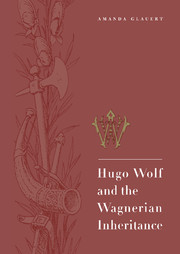
-
Select format
-
- Publisher:
- Cambridge University Press
- Publication date:
- October 2009
- January 1999
- ISBN:
- 9780511585425
- 9780521496377
- 9780521028080
- Dimensions:
- (247 x 174 mm)
- Weight & Pages:
- 0.465kg, 170 Pages
- Dimensions:
- (247 x 174 mm)
- Weight & Pages:
- 0.288kg, 172 Pages
- Subjects:
- Music, Nineteenth-Century Music
You may already have access via personal or institutional login- Subjects:
- Music, Nineteenth-Century Music
Book description
Wolf has been regarded as a composer who followed the style and aesthetics of Wagnerian music drama without question, while writing in a genre often seen as less challenging than the symphony or opera. This 1999 book re-examines the evidence concerning Wolf's responses to Wagner and Wagnerism and suggests ways in which he voiced his criticism through song, and his one completed opera Der Corregidor. This opens up insights into the kind of impact Wagner had on those following in his wake, and into the complexity and subtlety of the late nineteenth-century Lied. From this perspective, Wolf emerges as a persuasive and articulate figure of wide musical and artistic significance.
Reviews
‘… Glauert’s illustrative and analytical detail is always subordinate to the energy and clarity of her argument. And that argument itself is truly deductive: it leaps out from an honest, keen-eared study of Wolf’s music, rather than imposing a wilful agenda on it.’
Hilary Finch Source: BBC Music
Contents
Metrics
Altmetric attention score
Full text views
Full text views help Loading metrics...
Loading metrics...
* Views captured on Cambridge Core between #date#. This data will be updated every 24 hours.
Usage data cannot currently be displayed.
Accessibility standard: Unknown
Why this information is here
This section outlines the accessibility features of this content - including support for screen readers, full keyboard navigation and high-contrast display options. This may not be relevant for you.
Accessibility Information
Accessibility compliance for the PDF of this book is currently unknown and may be updated in the future.


